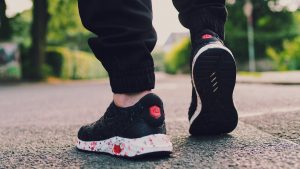
Plantar fasciitis, a common yet often debilitating foot condition, affects millions of individuals worldwide, causing persistent heel pain and discomfort.
Selecting the right footwear is crucial in managing this condition, as the type of shoes you wear can significantly impact your recovery and overall comfort.
Are Stiff or Flexible Shoes Better for Plantar Fasciitis? A Complete Guide
Understanding Plantar Fasciitis
What is Plantar Fasciitis?
Plantar fasciitis is a condition where the band of tissue running along the bottom of your foot becomes inflamed. This tissue, called the plantar fascia, acts as a shock absorber and supports the arch of your foot.
Symptoms and Causes
Common symptoms include sharp heel pain, especially after waking up or prolonged periods of inactivity. Causes range from overuse and high-impact activities to wearing unsupportive footwear.
Who is Most at Risk?
Athletes, individuals with flat feet or high arches, and those who spend long hours standing are more prone to developing plantar fasciitis.
The Role of Shoes in Managing Plantar Fasciitis
How Shoes Impact Foot Health
Shoes can either exacerbate or alleviate plantar fasciitis. Supportive footwear minimizes strain on the plantar fascia, promotes healing, and reduces discomfort.
Key Features of Supportive Footwear
- Adequate arch support
- Firm midsoles
- Heel cushioning
- Proper fit and width
Stiff vs. Flexible Shoes: The Basics
Defining Stiff Shoes
Stiff shoes have rigid soles and structured uppers, offering stability and firm support.
Defining Flexible Shoes
Flexible shoes are bendable and lightweight, allowing natural foot movement and adaptability.
Initial Comparison of Benefits
While stiff shoes prioritize stability, flexible shoes offer comfort and freedom of movement. The choice isn’t one-size-fits-all—it depends on individual needs.
Benefits of Stiff Shoes for Plantar Fasciitis
- Enhanced Arch Support
Stiff shoes often come with built-in arch support, reducing strain on the plantar fascia. - Stabilizing the Foot
A firm sole helps prevent excessive foot rolling (overpronation), which can aggravate symptoms. - Reducing Strain on the Plantar Fascia
By limiting foot movement, stiff shoes reduce stress on inflamed areas.
Drawbacks of Stiff Shoes
- Limited Movement
Stiff shoes may restrict the natural range of motion, potentially leading to discomfort. - Potential Discomfort
Not all feet tolerate rigidity well, especially those with unique anatomical needs.
Benefits of Flexible Shoes for Plantar Fasciitis
- Encouraging Natural Movement
Flexible shoes mimic barefoot walking, which can help maintain foot flexibility. - Lightweight and Comfortable Design
These shoes are often lighter, reducing overall foot fatigue. - Adaptability to Various Foot Shapes
Flexible materials accommodate different foot structures, providing a personalized fit.
Drawbacks of Flexible Shoes
- Insufficient Arch Support
Many flexible shoes lack adequate support, which can worsen plantar fasciitis. - Risk of Overstretching the Plantar Fascia
Excessive flexibility can strain already inflamed tissues.
What Experts Say
Recommendations from Podiatrists
Podiatrists often suggest a middle ground—shoes that balance flexibility and support.
Clinical Studies Comparing Stiff and Flexible Shoes
Research shows that hybrid designs, combining rigid midsoles with flexible uppers, often provide the best results.
Choosing the Right Shoe for Your Needs
- Assessing Individual Foot Type
Flat feet and high arches have different requirements. - Considering Activity Levels
Daily walkers may need different shoes compared to runners. - Personal Comfort Preferences
Always prioritize how a shoe feels during wear.
Top Shoe Brands for Plantar Fasciitis Relief
Stiff Shoe Recommendations
- Brooks Beast
- ASICS Gel-Kayano
Flexible Shoe Recommendations
- Nike Free Run
- New Balance Fresh Foam
Specialized Footwear Options
Orthopedic Shoes
Designed specifically for medical needs, offering unmatched support.
Custom Orthotics
Tailored insoles can make any shoe plantar fasciitis-friendly.
Sandals and Insoles
Brands like Birkenstock and Superfeet offer excellent alternatives for casual wear.
Lifestyle Tips for Managing Plantar Fasciitis
- Stretch your calves and Achilles tendon regularly.
- Ice your foot after activity.
- Avoid walking barefoot on hard surfaces.
Common Misconceptions
- Myth: Flexible shoes always worsen plantar fasciitis.
Fact: Flexibility isn’t bad if paired with adequate support. - Myth: Stiff shoes guarantee relief.
Fact: They may not suit everyone, especially if improperly fitted.
Are Stiff Or Flexible Shoes Better For Plantar Fasciitis? FAQs
- Can I wear flip-flops with plantar fasciitis?
Flip-flops generally lack support but orthopedic sandals are a good alternative. - Are running shoes good for plantar fasciitis?
Many running shoes offer excellent arch support and cushioning. - How do I know if my shoes are supportive enough?
Look for a firm midsole, cushioned heel, and proper arch support. - Do I need custom orthotics for plantar fasciitis?
Custom orthotics can help if standard shoes don’t provide relief. - How long does it take for plantar fasciitis to heal with proper footwear?
Recovery varies but wearing supportive shoes consistently can significantly reduce symptoms within weeks
Conclusion
When it comes to plantar fasciitis, both stiff and flexible shoes have their merits. The best choice depends on individual needs, including foot anatomy, activity level, and comfort preferences.  Striking the right balance between support and flexibility often provides the most effective relief. Always prioritize trying on shoes and consulting professionals to make the best decision for your feet.
Striking the right balance between support and flexibility often provides the most effective relief. Always prioritize trying on shoes and consulting professionals to make the best decision for your feet.
Recent Posts
Choosing the best 80 watt soldering iron for electronics can dramatically improve your workflow, precision, and soldering quality. Whether you’re a beginner hobbyist, DIY repair enthusiast, or...
Kenya’s Deputy President Kindiki’s Luxury Cars Maybachs Raise Questions Amid Public Struggle
Corruption and inequality continue to dominate Kenya’s political landscape, leaving ordinary citizens frustrated and disenfranchised. Recently, Deputy President Kithure Kindiki made headlines after...